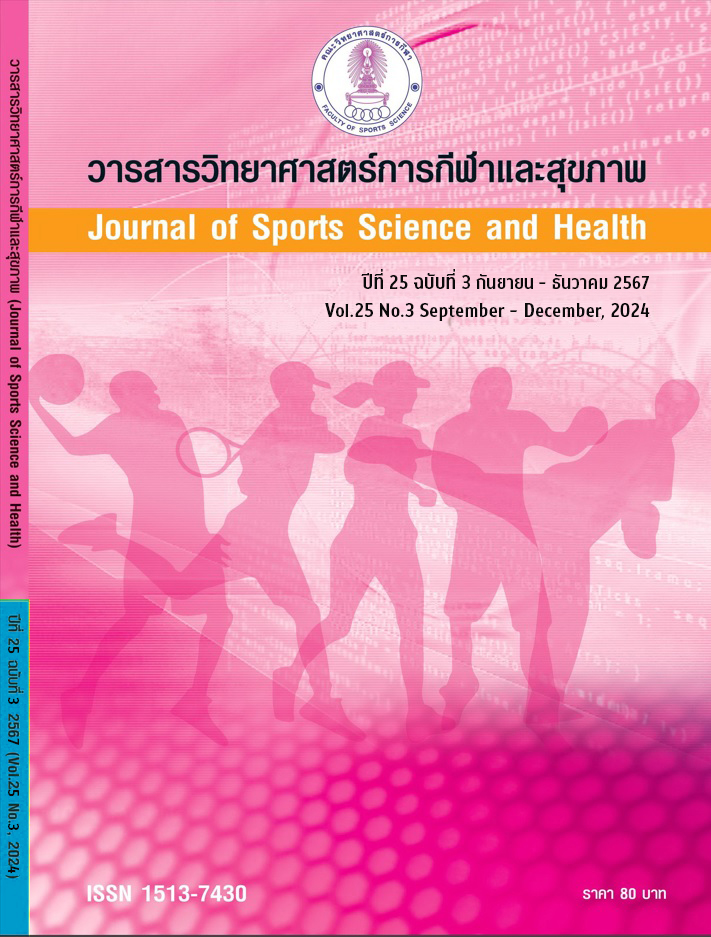ACHIEVEMENT MOTIVATION OF MARATHON RUNNERS IN UTTARADIT PROVINCE
Main Article Content
Abstract
Purpose
To examine the achievement motivation levels of marathon runners in Uttaradit Province and to compare these levels based on variables of age and competition experience.
Methods
The sample group consisted of 22 marathon runners from Uttaradit Province, selected using purposive sampling. The research instruments included an achievement motivation scale, which consisted of general information, the achievement motivation scale itself, and an interview form. The data were analyzed quantitatively using frequency distribution, percentage, mean, and standard deviation. Differences were tested using One-way ANOVA, followed by pairwise comparisons using the LSD (Least Significant Difference) method. The significance level was set at 0.05.
Result
The study revealed that marathon runners in Uttaradit Province have a high overall level of achievement motivation. When comparing overall achievement motivation levels based on age and competition experience, the results showed no statistically significant differences at the 0.05 level. However, when comparing specific aspects of achievement motivation, it was found that runners of different ages had significantly different levels of self-efficacy at the 0.05 level. The interviews indicated that the most influential factors contributing to the success of marathon runners were self-efficacy and planning, which are key motivators that help athletes reach their goals and achieve success.
Conclusion
Marathon runners in Uttaradit Province exhibit a high overall level of achievement motivation, with specific aspects of motivation also being at a high level. There is no significant difference in overall achievement motivation among runners of different ages and competition experience. However, runners aged 20-29 years demonstrate the highest level of self-efficacy in terms of achievement motivation.
Article Details

This work is licensed under a Creative Commons Attribution-NonCommercial-NoDerivatives 4.0 International License.
References
Bongkotpannarai, L. (2017). A study of communication factors and attitude which influence The decision to participate in marathon. Master’s Thesis, Faculty of Journalism and Mass Communication, Thammasat University. Pathum Thani.
Boonprasert, S., Srijai, P., Tuongratanaphan, S., and Nirunsittirat, A. (2020). Meaning of running and the empowerment in long distance runners: the runner’ perspective at Phrae Provincial administrative organization stadium. Thai Journal of Health Education, 43(2), 33-44.
Boudreau, A. L., and Giorgi, B. (2010). The experience of self-discovery and mental change in female novice athletes in connection to marathon running. Journal of Phenomenological Psychology, 41(2), 234-267.
Chailert, P. (2013). Effects of cognitive behavioral modification on achievement motivation of tennis players. Doctoral dissertation, Faculty of Sports Science, Chulalongkorn University. Bangkok.
Darachai, W. (2011). Factors related to academic self-efficacy of second and third level students. Master’s Thesis, Faculty of Education, Srinakharinwirot University. Bangkok.
Department of physical education. (2013). Sport Psychology. Bangkok: Office of the Printing Affairs, Veterans Affairs Organization under the Royal Patronage.
Julvanichpong, T. (2012). Sport Psychology. Faculty of Sport Science, Burapha University. Chonburi.
Julvanichpong, T., Darasak, D., Julvanichpong, W., and Kunsinh, P. (2020). Relationship of Self-efficacy, exercise motivation and biosocial factors to exercise behaviors in elder. Research and Development Health System Journal, 13(2), 240-249.
Kormart, A., Lertwittayakul, T., and Rujit, W. (2018). Supporting factors by motivation theory of McClelland to readiness of female football players, College of Asian Scholars Team, Khon Khaen Province. College of Asian Scholars Journal, 8(1), 141-148.
Krabuanrat, J. (2014). Science of coaching. Bangkok: Sintana copy center company limited.
Luckrunningshop. (2024). 2020: 5 Mental Strategies to Improve Your Performance in Long-Distance Marathons. Retrieved July 19, 2024, from Lnwshop Website: https://www.luckrunningshop.com/article/13/.
NBA Sportmanagement. (2024). How to Prepare for a Marathon (Online). Retrieved July 19,2024, from NBA Sportmanagement Website: https://www.nbasport.co.th/blog/marathon-practice.
Rakpuang, S. (2019). Marathon Thailand: social network and challenges in 21st century. Romphruek Journal Krirk University, 31(1), 7-17.
Rueboon, W., Jornkokgoud, K., Chantra, S., Jairew, W., and Ruengthip, P. (2021). Behavioral Relationships that affect the intention of participating in a marathon in Thailand during the COVID-19 crisis. Research and Development Journal Suan Sunandha Rajabhat University, 13(2), 156-175.
Shipway, R., Holloway, I., and Jones, I. (2013). Organisations, practices, actors, and events: Exploring inside the distance running social world. International Review for the Sociology of Sport, 48(3), 259-276.
Singhnoy, C. (2013). Sport Psychology. Faculty of Sports Science, Burapha University. Chonburi.
Yodthanaworakul, S. (2018). The achievement motivation working of teachers in Wangnamyenwittayacom school under the office of secondary education service area7. Master’s Thesis, Faculty of Education, Burapha University. Chonburi.


